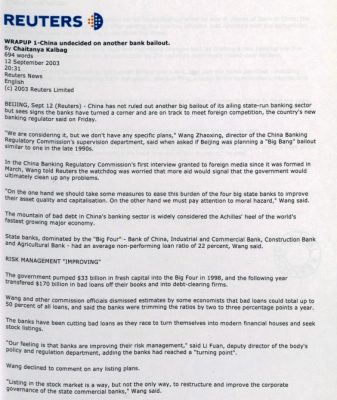Wrapup 1- China undecided on another bank bailout
[Reuters]
Published date: 12th Sep 2003
12 September 2003
Reuters News
English
(c) 2003 Reuters Limited
BEIJING, Sept 12 (Reuters) – China has not ruled out another big bailout of its ailing state-run banking sector but sees signs the banks have turned a corner and are on track to meet foreign competition, the country’s new banking regulator said on Friday.
“We are considering it, but we don’t have any specific plans,” Wang Zhaoxing, director of the China Banking Regulatory Commission’s supervision department, said when asked if Beijing was planning a “Big Bang” bailout similar to one in the late 1990s.
In the China Banking Regulatory Commission’s first interview granted to foreign media since it was formed in March, Wang told Reuters the watchdog was worried that more ald would signal that the government would ultimately clean up any problems.
“On the one hand we should take some measures to ease this burden of the four big state banks to improve their asset quality and capitalisation. On the other hand we must pay attention to moral hazard,” Wang said.
The mountain of bad debt in China’s banking sector is widely considered the Achilles’ heel of the world’s
fastest growing major economy.
State banks, dominated by the “Big Four” – Bank of China, Industrial and Commercial Bank, Construction Bank and Agricultural Bank – had an average non-performing loan ratio of 22 percent, Wang said.
RISK MANAGEMENT “IMPROVING”
The government pumped $33 billion in fresh capital into the Big Four in 1998, and the following year
transfered $170 billion in bad loans off their books and into debt-clearing firms.
Wang and other commission officials dismissed estimates by some economists that bad loans could total up to 50 percent of all loans, and said the banks were trimming the ratios by two to three percentage points a year.
The banks have been cutting bad loans as they race to turn themselves into modern financial houses and seek stock listings.
“Our feeling is that banks are improving their risk management,” said Li Fuan, deputy director of the body’s policy and regulation department, adding the banks had reached a “turning point”.
Wang declined to comment on any listing plans.
“Listing in the stock market is a way, but not the only way, to restructure and improve the corporate
governance of the state commercial banks,” Wang said.
The clock is ticking for China’s banks. In 2006, they will face competition from foreign banks who will then be allowed to conduct a full range of services.
China will phase out heavy capital requirements imposed on foreign banks setting up branches after 2006. The requirement can add up to as much as 600 million yuan ($72.5 million) for a single branch offering all permitted services.
“They … will gradually get the same treatment as Chinese banks after the year 2006. But currently, it’s
necessary,” Wang said.
STABLE YUAN NEEDED
Headed by Liu Mingkang, who won praise for his housecleaning when he was In charge of Bank of China, the commission began work in early May after settling in a low-key complex that contrasts with the gargantuan and flashy headquarters of the big banks down the street.
Its focus so far has been on making legal and regulatory changes such as drafting a new banking law that mandates better transparency and accountability by the country’s notoriously closed-door lenders.
The law, which may be enacted by parliament before year’s end, also lays out harsh penalties – including
possible jail time – for misbehaving bank managers, said Luo Ping, adviser to the commission’s international department.
Luo also sounded off on recent pressure by the United States and other countries for China to float the yuan, saying the currency needed to be stable to stifle speculation that has brought billions of dollars into the country.
“The government has made it very clear the renminbi (yuan) will remain stable,” Luo said.
“It has to be stable at this moment, because otherwise we give the hot money a chance to make a huge profit and cause a lot of havoc, that’s something we have to avoid at this moment,” he said.






